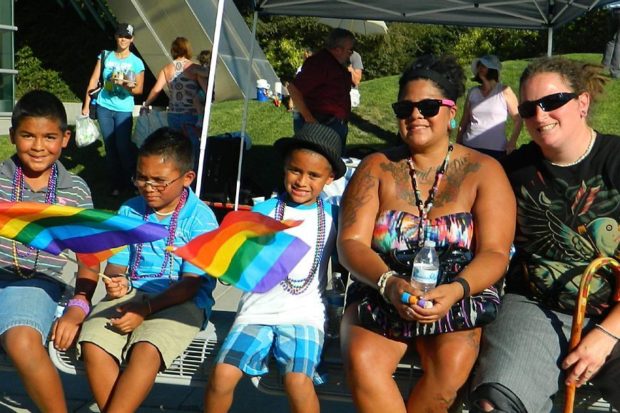
By Kaylia Metcalfe

With the Supreme Court’s ruling earlier this summer reopening the doors for California’s same-sex couples to legally tie the knot, hundreds of people have taken advantage of their “new” legal rights. Of course, we wish them well. Marriage is a fundamental right, a proven aid to living a longer and happier life, and a wonderful way to celebrate commitment and love.
So, where do we go from here?
First, the adage of “just because you can, doesn’t mean you should” applies equally to same-sex couples as it does to their hetero-normative counterparts. One hopes the current rush of courthouse steps, country clerk’s offices and last-minute backyard weddings will not have the downside of an equally large rush of divorces next year. The divorce rate in this country is atrocious: 41% for first marriages, higher for second marriages at 60% and a whopping 73% for third marriages. Ideally, it would be nice to see those numbers go down with the rise of same-sex marriages.
In the weeks since the ruling (and the lifting of the stay by the 9th Circuit Court of Appeals), Central Valley county clerk’s offices have had an increase in marriage license requests. Although most county offices are now refusing to give out specifics in terms of numbers or gender of those requesting, the staff that I talked to did confirm that more marriage licenses have been requested in July 2013 than in July 2012.
But something to consider as you are lifting a glass to your newlywed friends is that the fight for equality is far from over.
In California, the Alliance Defending Freedom filed a petition with the high court in mid-July asking the justices to stop county clerks from issuing same-sex marriage licenses. The group maintains, in what we can only hope is a last-ditch effort, that the Supreme Court’s ruling only pertained to the two couples who were part of that lawsuit and therefore should not overturn the 2008 voter-approved ban. Similar attempts to get around the June ruling have thus far been dismissed, as this one is bound to be, but the lesson here is clear: Anti-equality groups are not going away.
Rep. Tim Huelskamp (R–Kan.) has already introduced legislation to amend the U.S. Constitution to define marriage as between a man and a woman, and Indiana Governor Mike Pence is urging his state legislature to approve a popular vote planned for 2014 that would ban gay marriage in that state.
There are currently 29 states with constitutional bans against same-sex marriage on the books. 29!
We have seen it happen again and again—a victory for equality and then a forced step back. (State Senator Wendy Davis’s uphill battle with Texas lawmakers and the George Zimmerman acquittal are two such examples that spring instantly to mind.)
But there is hope.
Same-sex marriage is now legal in the District of Columbia and in 13 states. In Illinois, gay marriage will be up for a vote in October and equality advocates seem optimistic. In New Jersey, despite Governor Chris Christie’s vehement vow to continue to veto any such legislation, the issue is being considered with a group of seven couples arguing in the state’s courts in August that civil unions are not equal under the law. And in Hawaii, where the fear of same-sex marriage led to the Defense of Marriage Act (DOMA) in the first place, advocates are pushing the courts and feel optimistic that they will have victory there or with the state’s legislative branch.
But let us not forget our LGBT community around the world. Equality advocates were horrified last month when Russia passed a law making it a crime to hold gay pride events or give any information about anything related to LGBT to children. A provision in the law also holds foreign tourists to the same laundry list of offenses, which include, but are not limited to, taking part in gay affirmation speech, displaying a rainbow flag or same-sex couples showing affection (e.g., handholding in public).
Russia, by the way is set to host the Winter Olympics next year. Advocacy groups are already getting involved: Boris O. Dittrich, advocacy director of the LGBT Rights Program at Human Rights Watch, has notified the International Olympics Committee that “Human Rights Watch’s long-standing position is that there cannot be a successful Olympics where there is discrimination or human rights abuses…Foreigners—possibly including athletes—who violate the law, including possibly by speaking about their sexual orientation in public, run the risk of being fined, arrested for up to 15 days, and deported from Russia.”
Fellow advocacy groups are calling for more international attention to be shown to this issue. Possible boycotts and several letter-writing campaigns are being discussed.
So, what is next for the equality movement? Support (financial and other) for these new battleground states and causes. We, as a community, need to be educated and to begin thinking of this fight on a larger scale. Yes, California is relatively safe. But until we have swept the country, and then the world, until all of our community is afforded equality, we cannot rest easy.
*****
Kaylia Metcalfe is a writer, blogger and activist in Fresno. She is a cofounder of Skeptics Without a Cause and serves on the Gay Central Valley Board of Directors. Her short story collection “Links” is available at www.amazon.com. Contact her at
